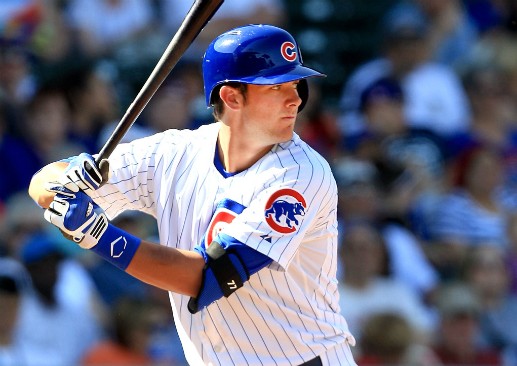The Chicago Cubs faced their archrival, the St. Louis Cardinals on Sunday night to kick off the 2015 Major League Baseball season. St. Louis came out on top, 3-0. And one Cubs player was noticeably absent: 23-year-old slugger Kris Bryant.
Bryant, a third baseman, became a sensation during the Cubs’ spring training season, when he had a .425 batting average with nine home runs in only 40 at-bats.
That impressive statistics line was not enough to convince Theo Epstein, Chicago’s president of baseball operations, to put his most hyped prospect on his club’s opening day roster.
From an executive’s point of view, there was good reason. By keeping Bryant in Triple-A for roughly 10 more games, he won’t be a free agent until 2021, and a year of costly arbitration could be avoided.
Baseball contracts have two big milestone: arbitration, and free agency.
Arbitration does not occur until a player has achieved three full seasons of playing time on a big league roster. A full season is considered to be 172 out of 183 possible service days.
Until that three-year benchmark, the original contract signed between a player and a club remains in force.
Negotiations between a ballplayer and his club take place before the season begins, so if he has not accrued 516 days in the Majors prior to opening day that year, it’s not possible for him to have a say in his salary negotiations.
Free agency takes effect after six years of service in MLB have been logged. Years playing for their clubs’ minor league teams do not count.
Once those six years are up, a player can opt to stay with his current team or seek a deal with a different club. By this point, a player usually achieves full market value.
Bryant currently has zero Major League service days; if the Cubs keep him in the minors for at least 12 days after they face the Cardinals, he’ll put in 171 days. This means he won’t be eligible for arbitration until 2018 — if he were to log one extra day this season, he could negotiate with Epstein in 2017.
In other words, keeping Bryant in the minors for 12 more days means the Cubs have a potential superstar suiting up for them at a lower price for an extra year.
Despite the outcome of opening night, Cubs fans finally feel like they have a shot at contending for a World Series this year. So, they weren’t too happy when they heard this news, even if it means they’ll hold onto Bryant for another year before he is eligible for free agency.
Scott Boras, the 23-year-old’s agent, was beyond livid. He ranted to USA Today about Epstein’s move.
“You are damaging the ethics and brand of Major League Baseball. Kris Bryant has extraordinary skills. Kris Bryant is a superstar. He has distinguished himself from all players at every level he’s played. Everybody in baseball is saying he’s a major-league player ready for the big leagues. I have players call me. Executives call me. The Cubs’ people want him there. Everyone says, ‘They cannot send this guy down.’ It’s too obvious.”
Bryant was also disappointed by the Cubs’ decision.
Kris Bryant just spoke publicly for the first time since being sent down. “I’m extremely disappointed.” Going on ESPN 1000 right now
— Jesse Rogers (@ESPNChiCubs) April 2, 2015
Epstein told USA Today that he’s not keeping him in Triple-A to save the Cubs some cash down the line, citing Bryant’s need to develop more defensively.
One question remains, however: Is this truly a sound financial move for Chicago?
Keith Olbermann tried to argue that it’s not good business on ESPN, explaining that holding Bryant back could cost the Cubs a crucial game or two that could push them into the postseason or give them home-field advantage.
Olbermann used examples of how Epstein — then Boston’s general manager — held back pitcher Jon Lester and second baseman Dustin Pedroia in 2006 for similar reasons. This might have cost the Red Sox the wins they needed to capture a wild card spot (they finished third in the American League East that year).
Lester and Pedroia, however, were held in the minors for months before they were brought up. Bryant will likely be added to the Cubs’ roster by the beginning of May, as Chicago only needs to keep him in Triple-A for 10 games to hold onto him until 2021.
Over at Fox Sports, Dave Cameron writes that 10 games would not have a significant impact on the Cubs’ season, and the potential wins above replacement (also called WAR) that Chicago is losing from sitting Bryant do not outweigh the financial boon of avoiding a year of arbitration.
According to Cameron’s calculations, Bryant is expected to produce +1.5 WAR every 200 plate appearances or approximately 50 games. In other words, if he misses 10 games the Cubs are only losing +0.3 of added value.
Right now the market place for a single win, according to Fox Sports, is $10 million. So Chicago is effectively losing $3 million from sitting the 23-year-old. Meanwhile, if the Cubs were to start Bryant and lose control over the 2020 season, Bryant could be making $25 to $30 million.
Clearly, sitting him now has far higher value than suiting him up for the Cubs’ first few weeks of games. That’s how Epstein, despite vehement objections from fans, Boras and even Bryant himself, has been able to deal with the criticism.











